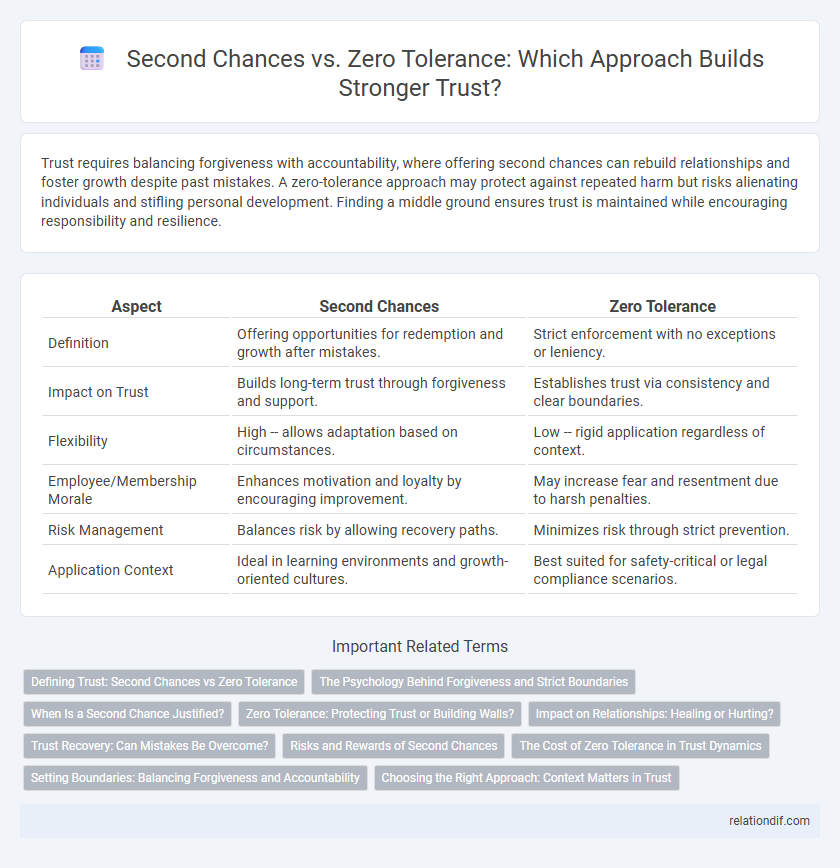Trust requires balancing forgiveness with accountability, where offering second chances can rebuild relationships and foster growth despite past mistakes. A zero-tolerance approach may protect against repeated harm but risks alienating individuals and stifling personal development. Finding a middle ground ensures trust is maintained while encouraging responsibility and resilience.
Table of Comparison
| Aspect | Second Chances | Zero Tolerance |
|---|---|---|
| Definition | Offering opportunities for redemption and growth after mistakes. | Strict enforcement with no exceptions or leniency. |
| Impact on Trust | Builds long-term trust through forgiveness and support. | Establishes trust via consistency and clear boundaries. |
| Flexibility | High -- allows adaptation based on circumstances. | Low -- rigid application regardless of context. |
| Employee/Membership Morale | Enhances motivation and loyalty by encouraging improvement. | May increase fear and resentment due to harsh penalties. |
| Risk Management | Balances risk by allowing recovery paths. | Minimizes risk through strict prevention. |
| Application Context | Ideal in learning environments and growth-oriented cultures. | Best suited for safety-critical or legal compliance scenarios. |
Defining Trust: Second Chances vs Zero Tolerance
Trust builds resilience through second chances by acknowledging human fallibility and encouraging growth from mistakes. Zero tolerance policies prioritize safety and accountability, often reinforcing clear boundaries to prevent repeated harm. Balancing trust requires evaluating the context, severity, and potential for genuine change.
The Psychology Behind Forgiveness and Strict Boundaries
Forgiveness involves complex psychological processes such as empathy, understanding, and the restoration of trust, which can promote emotional healing and strengthen relationships. Strict boundaries, rooted in zero tolerance, serve as protective mechanisms that prevent repeated harm and maintain personal integrity by clearly defining acceptable behavior. Balancing second chances with firm limits requires recognizing when forgiveness fosters growth and when rigid boundaries are essential for self-preservation.
When Is a Second Chance Justified?
A second chance is justified when evidence of genuine remorse, consistent positive behavior, and a clear commitment to change is present, allowing trust to be cautiously rebuilt over time. Zero tolerance policies often fail to account for human fallibility and the potential for growth, risking the loss of valuable relationships or talents. Balancing accountability with empathy ensures second chances serve as opportunities for rehabilitation rather than enabling repeated offenses.
Zero Tolerance: Protecting Trust or Building Walls?
Zero tolerance policies prioritize safeguarding trust by enforcing strict boundaries that prevent breaches and maintain consistent standards of integrity. While this approach minimizes risks of repeated violations, it can also create rigid barriers that hinder open communication and relationship repair. Balancing protection with flexibility is essential to avoid building walls that damage trust rather than strengthen it.
Impact on Relationships: Healing or Hurting?
Second chances foster healing in relationships by allowing trust to rebuild through empathy and forgiveness, reinforcing emotional bonds over time. Zero tolerance policies, while promoting accountability, often lead to distance and unresolved tensions that hinder trust restoration. Balancing empathy with clear boundaries creates a pathway for meaningful reconciliation without compromising personal integrity.
Trust Recovery: Can Mistakes Be Overcome?
Trust recovery hinges on acknowledging mistakes and demonstrating consistent, transparent efforts to rebuild credibility. Second chances allow relationships to heal through accountability and genuine change, fostering long-term trust resilience. Zero tolerance policies may prevent repeated harm but can hinder opportunities for growth and restoration of trust.
Risks and Rewards of Second Chances
Second chances in trust management involve weighing the risks of potential betrayal against the rewards of restored loyalty and strengthened relationships. While zero tolerance minimizes immediate risks by enforcing strict consequences, granting a second chance can foster growth, resilience, and deeper mutual understanding. Strategic trust restoration requires careful assessment of past behavior patterns and commitment to transparent communication to mitigate future breaches.
The Cost of Zero Tolerance in Trust Dynamics
Zero tolerance policies in trust dynamics often lead to rigid boundaries that hinder relationship repair and growth, resulting in long-term emotional costs and decreased collaboration. The absence of second chances erodes trust resilience, making individuals and organizations less adaptive to mistakes or misunderstandings. Investing in second chances promotes trust rebuilding, fosters open communication, and ultimately strengthens relational bonds.
Setting Boundaries: Balancing Forgiveness and Accountability
Setting boundaries in trust involves balancing forgiveness with accountability to foster healthy relationships. Second chances encourage growth and repair by acknowledging human errors while maintaining clear limits to prevent repeated breaches. Zero tolerance upholds strict standards that protect trust but may hinder reconciliation and personal development when forgiveness is withheld.
Choosing the Right Approach: Context Matters in Trust
Choosing the right approach to trust depends heavily on the context and nature of relationships involved. Second chances can rebuild trust when mistakes stem from misunderstandings or isolated incidents, fostering growth and forgiveness. Zero tolerance applies best in situations demanding strict accountability, especially where repeated breaches risk safety or integrity.
Second chances vs Zero tolerance Infographic

 relationdif.com
relationdif.com